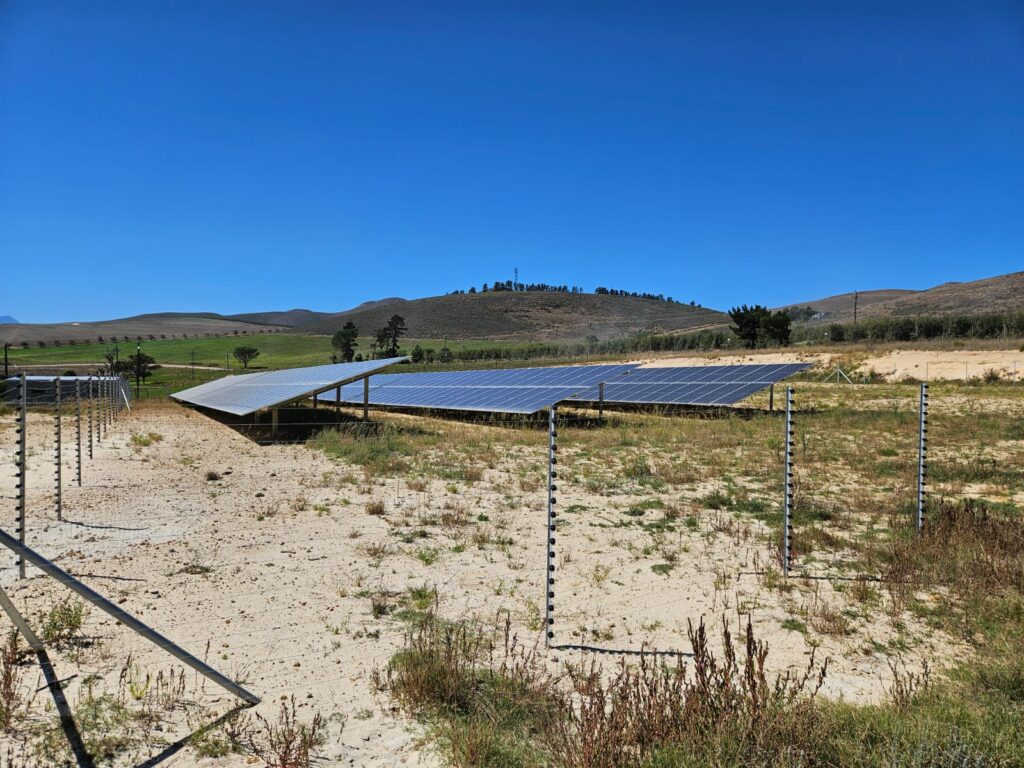Read in
While load shedding causes major headaches for most farmers who rely on irrigation and cooling facilities, many Tru-Cape producers have made significant investments in alternative energy sources. This ensures a reliable supply while also saving costs and reducing their environmental footprint.
Close to Caledon, the Van Niekerk Boerdery is one of Tru-Cape’s apple and pear producers doing their bit for the environment. They saved 27.34 tonnes of standard coal, reduced their carbon dioxide (CO2) emissions by 32.47 tonnes, and planted the equivalent of 45 trees since their investment in solar power in October of last year.
“Although it is born out of necessity, every farmer wants to care for the environment. “Solar energy is available; it benefits me, and it benefits the environment, making it a win-win situation,” says Wimpie van Niekerk, who oversees the apple and pear orchards and Jersey dairy on the family’s farm, Spes Bona. They also produce wheat and raise Dohne Merino sheep.
“The greatest advantage of solar energy is the independence it provides us. In the past, Eskom used to dictate when and if we could farm, but thanks to alternative energy sources, we can now farm the way we should. It also works in our favour when we can demonstrate to auditing bodies that we are working towards a more sustainable future.”
Wimpie credits his cousin, Niekie van Niekerk, as the brains behind their system. NIekie created their cost-efficient strategy for implementing solar energy.
Wimpie, who is also a qualified engineer, explains that their first step was to enlarge the farm’s pipelines and pumps and equip all pumps with variable speed drive (VSD) technology. This enabled them to irrigate larger orchards in shorter periods. They also have the advantage of a gravitational dam for irrigation purposes. The next step was consolidating the four Eskom power points on the farm into one larger point, which resulted in another significant saving.
Although they have always relied on a 100 kW generator for backup power in the dairy, it was insufficient to keep the irrigation system running. For this purpose, they invested in 100 kW of solar panels, which are also connected to the generator. When the sun is shining, the generator runs on solar power.
“We are still grid-tied, but approximately a third of our energy consumption now comes from the sun. Our system is much more efficient; resulting in significant cost savings, and we don’t have to worry about the availability of electricity and irrigation water.”
Rossouw Cillié, from Laastedrif Agri, near Ceres, has a strong passion for the environment and sustainable farming. He sees it as part of his legacy to eventually pass on a sustainable farming enterprise to his children. Don’t be surprised if you find a signpost on his farm alerting you to a breeding pair of plovers in the vicinity! Laastedrif Agri is also pioneering the recycling of effluent through a natural wetland filtration process for irrigation purposes.
Last year, they upgraded their alternative energy system, enabling them to generate approximately 300 kW of solar energy to use in their packhouses, which accounts for about a third of their total energy usage. They have reduced their CO2 emissions by 382.91 tonnes since January of last year. They also integrated their backup generator with the solar system to reduce the amount of diesel they use when solar capacity falls short.
Laastedrif Agri is currently in the planning phase of constructing balancing dams at elevated locations on the farm. This system will allow them to move water through gravity across the farm as necessary, further decreasing their dependence on fossil fuels.
The Viljoen family from Lemoenpoort in the Worcester district believes that sustainability is crucial for job creation. They still rely on generators when necessary, but their solar system is assisting significantly in maintaining production, especially in the vineyards.
“Our markets are increasingly shifting towards carbon calculators, and most auditing bodies inquire about your environmental impact. The greener you farm, the better,” they believe.
In the Ceres region, Nico Verhoef from Witzenberg Properties believes that it should be a priority for all producers to be environmentally conscious and gentle towards the Earth. For them as well, irrigation was a major challenge during power outages, often leading to production losses.
Farmers often find it challenging to complete their irrigation cycles during load-shedding. They either need to generate their own power or double their irrigation capacity. In South Africa, we are fortunate to have solar radiation as a valuable resource. In the Western Cape, solar production varies significantly between summer and winter, but it aligns well with our irrigation requirements.
Witzenberg Properties is fortunate to have only one centralized distribution point from which they receive electricity to irrigate approximately 600 ha on both farms, Dennekruin and Die Eike.
“It offered us the opportunity to set up a single solar system of about 1.4 MW. At certain times on sunny days (usually between 12h00 and 15h00) all our energy comes from the sun. However, when needed, we supplement it with Eskom power or diesel generators. We have two 500 kVA generators. Since our generators are integrated with the system, they are powered by solar energy (when available), reducing our diesel consumption and costs,” explains Nico.
The savings on their electricity bill are a welcome advantage, but he is also excited about reducing their carbon emissions.
“Given the fact that South Africa primarily relies on coal and now also on diesel for power generation, solar energy can have a significant impact. There is a push towards environmental audits, and it is reassuring to know that we are ahead of the curve,” he concludes.
For more information, please contact Lucille Botha at lucilleb@tru-cape.co.za or visit www.tru-cape.com. Follow Tru-Cape on X (@TruCapeFruit), Facebook (@Tru-Cape Fruit Marketing) and Instagram (@trucapefruit).



